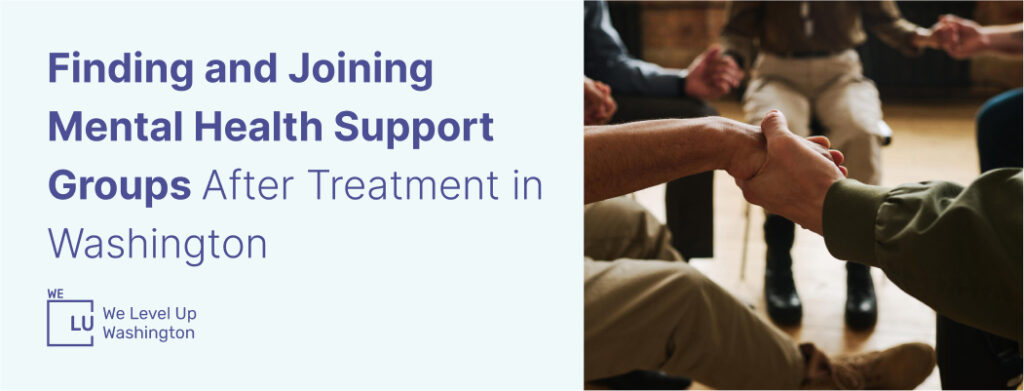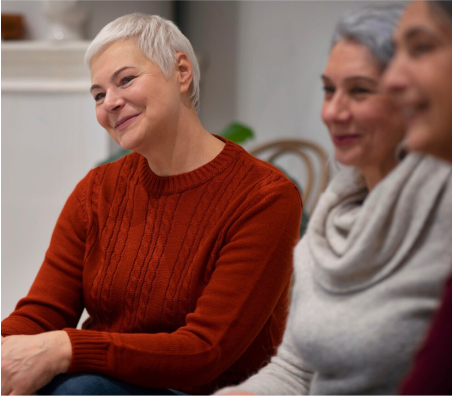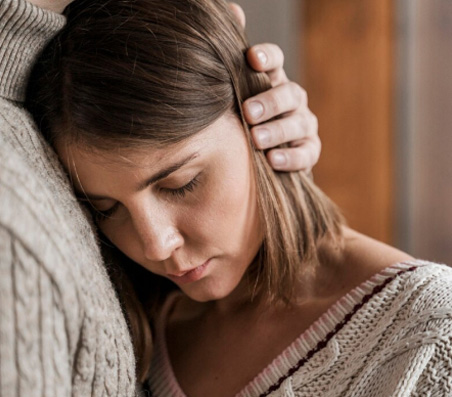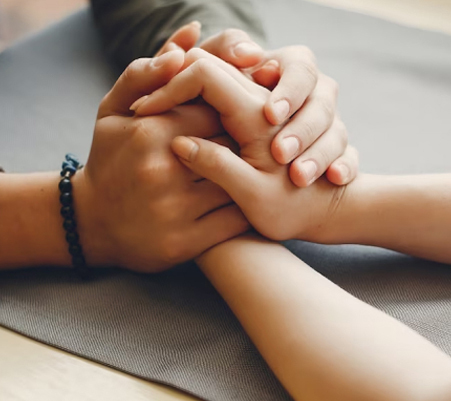Finishing your mental health treatment is a big step. However, keeping your mental health in check is a lifelong effort. After treatment, you will face new challenges. Situations like handling stress, dealing with people’s opinions, and making changes in your life can be tough. That’s why being part of a support group is so important. In mental health support groups, you can talk openly, share tips, and support each other. It’s a place where everyone understands what you’re going through and can help you keep moving forward. We are here to offer you Washington State mental health services and to guide and support you in finding the right group where you can continue to heal and grow.
Skip to:
Mental health issues in Washington
From February 1 to 13, 2023, a bit more than 1 in 3 adults in Washington, specifically 32.6%, reported feeling symptoms of anxiety and/or depression. This number is just slightly higher than the national average in the U.S., which stood at 32.3%. It shows that many people around us, maybe more than we realize, are dealing with these challenges.

Challenges requiring support groups for mental health after treatment
After finishing your treatment for mental health, stepping back into everyday life can bring a bunch of challenges your way. Here’s what you might run into:
- Stigma and feeling alone: Even after getting help, there’s still a lot of misunderstanding about mental health out there. You might find yourself feeling left out or judged by people you know, which can make it tough to open up or seek more help. This can make you feel lonely and affect your recovery.
- Symptoms might come back: Mental health issues don’t always go away for good. Stress, big changes, or certain things around you can bring symptoms back. Dealing with this can be stressful and might mean you need to adjust your recovery plan.
- Getting used to changes: Getting help often means making big changes in how you live, who you spend time with, and how you see yourself. Figuring out how to fit these changes into your life isn’t easy. It takes time, patience, and support to rebuild your life and find your new normal.
- Job and money worries: Dealing with mental health issues can throw a wrench in your work life, which can make money tight. This can add a lot of stress, especially when you’re trying to pay for basic needs and keep up with treatment.
- Hard to get ongoing care: Sometimes, it’s tough to keep getting the help you need after treatment. You might run into problems like insurance not covering what you need, long waits to see professionals, or not enough services in your area.
- Relationship struggles: Your relationships with family and friends might feel the strain from your mental health journey. You might need to work on understanding each other again, which can be really hard and takes a lot of talking and patience.
- Dealing with lingering symptoms: Even after treatment helps, you might still have some symptoms. Learning how to live with these ongoing challenges while keeping up with your recovery needs help from support groups for mental health and smart coping strategies.

The value of support groups for mental health
Participating in post-therapy support groups will help you recover more successfully. These groups give psychological and social benefits that are hard to find elsewhere. When you join a support group, you enter a community of people who understand what you are going through. Being a part of a community will empower you. It will make you feel less isolated and connect you to people who share similar experiences.
Support groups for mental health are a place where you can speak openly about your feelings, challenges, and successes. Hearing others share their stories can validate your own experiences and feelings. This validation is a strong psychological benefit. It can boost your self-esteem and help you see that recovery is within reach.
Get Help. Get Better. Get Your Life Back.
Searching for Accredited Dual Diagnosis Mental Health Centers Near You?
Even if therapy failed previously, or are in the middle of a difficult crisis, we stand ready to support you. Our trusted behavioral health specialists will not give up on you. When you feel ready or just want someone to speak to about counseling alternatives to change your life call us. Even if we cannot assist you, we will lead you to wherever you can get support. There is no obligation. Call our hotline today.
FREE 24/7 Dual Diagnosis Mental Health Services HotlineMoreover, a support group for mental health complements your post-therapy treatment. Whether you’re dealing with depression, anxiety, or dual diagnoses, these groups give you additional support. They provide a safe space to continue discussing and coping with your feelings and behaviors. In many cases, the strategies and coping mechanisms shared in these groups can enhance the skills you learned in therapy.

Finding mental health support groups
After finishing treatment, finding the right support group can make a big difference in staying on track. Here’s how to find one and what to think about when choosing:
- Look for related mental health support groups. Whether it’s anxiety, depression, or another mental health challenge, find a group that matches your needs. This way, you’ll meet people who really get what you’re going through.
- Consider the location and time. Pick a group that’s easy for you to get to and meets at times you’re free. If getting there is hard, you might not go as often as you’d like.
- Think about the group’s style. Some groups are more about talking and sharing, while others might focus on activities or education. Think about what feels right for you.
- Ask about the leader. A good leader can make a big difference. They should be kind, know a lot about mental health, and be good at making sure everyone feels heard.
- Try it out. It’s okay to visit a few groups before finding the one that feels like home. You want to feel safe and supported, so take your time to find the right fit.
- Online options. If getting to a meeting is hard, look for online mental health support groups. Search: Is there a mental health support group near me? They can be just as helpful, and you can join from anywhere.
The importance of a support group for mental health at We Level Up Washington
At We Level Up Washington, we give importance to joining support groups in recovery. This is something that you should continue after finishing your treatment program. Let’s explore how we use support systems within our treatment approaches and programs.
Inpatient treatment
We value mental health support groups and think they’re a key part of what we offer when you join inpatient mental health facilities in Washington State. These groups help you learn and heal. We talk about different topics to help you really understand what you’re going through. Knowing more about your symptoms and what causes them gives you power. It helps you handle the tough stuff that comes with mental health challenges.
In these groups, you get a safe place to talk about your feelings, share what you’ve been through, and get advice. We work on building skills to cope, communicate better, and handle your emotions. These skills are super important for getting better and staying well for the long haul.
End the Emotional Pain. Get Your Life Back.
Feeling Depressed, Anxious or Struggling with Mental Health Illness? Get Safe Comfortable Mental Health Dual Diagnosis High-Quality Therapy From Counselors That Care. Begin Your Recovery Now.
Hotline: (509) 348-4077

One of the best things about support groups for mental health while you’re here is finding people who understand you. Dealing with addiction can make you feel really alone. But in these groups, you’ll meet people who know exactly what it’s like. This feeling of not being alone is so important. It helps you feel understood and like you belong. Feeling this connection helps you accept yourself and what you’re dealing with. Accepting your situation is a huge step. It moves you from not wanting to face things to being ready to tackle your recovery head-on.

Dual diagnosis treatment
When you’re dealing with both addiction and a mental health issue, it’s like facing two battles at the same time. We get how tough this is at We Level Up, and that’s why we believe tackling both problems together is key to really getting better and staying that way.
Mental health support groups are very important during our dual diagnosis treatment in Washington State. These groups are a goldmine of real-world advice for handling the everyday stuff that gets tough. In these groups, you’re surrounded by people who get it because they’re walking the same road. This feeling of not being alone is a game-changer. It builds up your strength and keeps you pushing forward.
Here’s why dual diagnosis group therapy is helpful:
- Emotional support: Talking about what you’re going through and how you feel with people who really understand can make you feel a lot less alone with your dual diagnosis.
- Social support: Making friends with people who are in the same boat creates a support net that’s there when you need it the most.
- Practical advice: Everyone shares their own tricks for dealing with tough moments, from how to beat cravings to handling stress. This advice is helpful and works great alongside the professional treatment you’re getting.
Cognitive-behavioral therapy in mental health support groups
In CBT, or cognitive-behavioral therapy, there’s a big focus on figuring out and changing negative thoughts. Talking about these changes with others in mental health support groups during CBT for anxiety disorders and other mental health challenges can really help. When you share your discoveries and big moments of realizing certain thoughts aren’t helpful, it helps you and everyone else understand better. It’s like everyone’s learning together, which can lead to bigger changes in how you think.
First-class Facilities & Amenities
World-class High-Quality Mental Health Services & Behaviroal Health Substance Abuse Treatment
Rehab Centers TourRenowned Mental Health Centers. Serene Private Facilities. Inpatient Rehab Programs Vary.
Mental Health Helpline: (509) 348-4077Proven recovery success experience, backed by a Team w/ History of:
15+
Years of Unified Experience
100s
5-Star Reviews Across Our Centers
10K
Recovery Success Stories Across Our Network
- Low Patient to Therapist Ratio
- Comprehensive Dual-Diagnosis Treatment
- Complimentary Family & Alumni Programs
- Coaching, Recovery & Development Events
- Comfortable Onsite Medical Detox Center
Then there’s exposure therapy, where you slowly face what scares you to get past it. Doing this with the backing of a support group can make a huge difference. You can talk about what you’re doing to face your fears and how it’s going, and get cheers and support from the group. Hearing how others are doing the same thing and making progress can give you a push to keep going and try even harder.
Also, things like relaxation exercises and imagining peaceful scenes, which often go hand in hand with facing fears, can be done right there in the group. It’s a great place to practice these techniques and get better at them with people who are supporting you all the way.

Mental health support groups for anxiety disorders
If you’re battling anxiety disorders, being part of a support group can be a real game-changer. Here’s why:
- Feeling understood: In mental health support groups, you can talk about your ups and downs with people who get it because they’re going through it too. This shared understanding can make you feel less alone and cut through the stigma that often comes with mental health challenges.
- Getting new ideas: Everyone in the mental health support group brings their own ways of dealing with anxiety, which means you might learn something new. Hearing different stories and strategies can open up new ways for you to manage your own anxiety.
- Being careful with online tips. Online groups can be great for feeling connected, but take care with the advice you find. Not everything you read online will be right for you. Always check with a professional before trying out new advice.
- Extra support. Chatting with friends or someone you trust can also help you feel supported. But remember, as great as these mental health support groups online are, they don’t replace professional help from a doctor or therapist.
World-class, Accredited, 5-Star Reviewed, Effective Mental Health Dual Diagnosis Programs. Complete Integrated Inpatient Rehab with Free Post Discharge Therapy Planning.
Hotline: (509) 348-4077End the Emotional Pain Rollercoaster. Gain Stability & Happiness Through Recovery Treatment. Start Mental Health Counseling Today. Get Free No-obligation Guidance by Behaviroal Health Specialists Who Understand Mental Health Recovery.
We Level Up WA is here for you even after you leave
Recovery doesn’t stop the moment you step out of a treatment center. That’s why we offer ongoing support for you and your family, making sure you’ve got help whenever you need it as you face life after treatment, whether from depression, panic disorder, or anxiety.

We provide access to events and coaching on life, business, and recovery to keep you strong against the possibility of relapse. These opportunities teach you how to handle stress, enjoy life, and stay sober. Plus, being around people who’ve been where you are now is a big help. It makes you feel understood and part of a community that’s all about staying on the right track.
Here’s why these supports are great for you:
- Personal growth. The coaching and events we offer can really help you grow in both your job and personal life. Recovery is about more than just staying away from substances—it’s about becoming the best version of yourself.
- Family healing. Addiction affects not just you but your whole family. Our free support for families helps everyone heal and understand each other better. This healing is key to creating a home life that supports staying sober.
- Lifelong resources. Knowing you have support for life, for both you and your family, means you’re never alone, no matter what comes up down the road. Whether you’re facing new challenges or just need some advice, we’re here to catch you, always making a huge difference in keeping recovery going strong.

Get the support you need and stay well
Support groups for mental health can give you that extra boost you need. They’re all about people coming together, sharing their stories, and helping each other out. Our center is here to offer you the support you need, no matter what you’re going through. Joining mental health support groups means you’ll have people to talk to who understand what you’re dealing with. These groups make everything a bit easier for you. So contact We Level Up Washington and find out how we can help.
Experience Transformative Recovery at the We Level Up Treatment Center.
See our authentic success stories. Get inspired.
Get the help you deserve.



Start a New Life
Begin with a free call to a behavioral health treatment advisor. Learn more about our dual-diagnosis programs. The We Level Up treatment center network delivers recovery programs that vary by each treatment facility. Call to learn more.
- Personalized Care
- Caring Accountable Staff
- World-class Amenities
- Licensed & Accredited
- Renowned w/ 5-Star Reviews
We’ll Call You
Source:
Mar 20, Published:, and 2023. “Mental Health and Substance Use State Fact Sheets.” KFF, 20 Mar. 2023, www.kff.org/statedata/mental-health-and-substance-use-state-fact-sheets/washington/#:~:text=As%20shown%20in%20the%20figure.
Kobori, Osamu, and Naoki Yoshinaga. “Investigation of the Effects of an Online Support Group for Mental Health Problems on Stigma and Help-Seeking among Japanese Adults: A Cross-Sectional Study (Preprint).” JMIR Formative Research, vol. 5, no. 9, 27 July 2020, https://doi.org/10.2196/21348.





